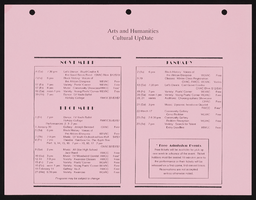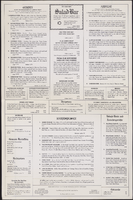Search the Special Collections and Archives Portal
Search Results

University of Nevada, Las Vegas (UNLV) 41st commencement program
Date
Archival Collection
Description
Commencement program from University of Nevada, Las Vegas Commencement Programs and Graduation Lists (UA-00115).
Text

Photographs of Mermaids Casino signs, Las Vegas (Nev.), June 24, 2016
Date
Archival Collection
Description
Site address: 32 Fremont St
Sign owner: Derek and Greg Stevens
Sign details: Shutdown in 2016, opened briefly June 28th, 2017 for 8 hours to abide by gambling license law, was torn down shortly after. 2.76 acre lot, originally built in 1949.
Sign condition: Signage was removed from building during deconstruction
Sign form: Decorated shed
Sign-specific description: Covering all the sides of the Mermaids facing Fremont street, gives the feel of New Orleans during Mardi Gras with its bright vibrant colors, drums, maracas, and other items. Skeleton neon was used to accentuate features of the sign like details in the drums, outlining the word "Mermaids", and a good portion of the sign was internally lit as well. Giant TV screen hung in the middle at the corner of the building, giant Sun shaped pinata thing above the TV screen adding more to the theme.
Sign - type of display: Neon, LED screen
Sign - media: Steel and fiberglass
Sign - non-neon treatments: LED screen
Sign animation: Animated with an LED TV screen and some neon would flash on and off
Sign environment: Downtown on Fremont Street, part of the Experience. Surrounded by other casinos and gift stores.
Sign - date of installation: c. 1999
Sign - date of redesign/move: Torn down Summer 2017
Sign - thematic influences: Southern party themed, Mardi Gras.
Sign - artistic significance: American South and Mardi Gras.
Survey - research locations: Vital Vegas, Assessor's website
Surveyor: Danny Jacobs
Survey - date completed: 2017-09-09
Sign keywords: Neon; Steel; Fiberglass; Flashing; Video screen; Sculptural
Mixed Content

Anita Tijerina Revilla oral history interview: transcript
Date
Archival Collection
Description
Oral history interview with Anita Tijerina Revilla conducted by Marcela Rodriguez-Campo on October 09, 2018 for the Latinx Voices of Southern Nevada Oral History Project. In this interview, Revilla discusses her early life in San Antonio, Texas. She talks about her decision to make education a priority, figuring out the college application process on her own, and her initial interest in social justice. Revilla talks about how her critical consciousness was developed, and her pedagogical approach to teaching. Revilla describes her role in the 2006 May Day march, advocating advocating for the queer community, and disrupting oppressive systems to increase educational access for students. Lastly, Revilla discusses ethnic studies and the history of inequality in the United States.
Text

Transcript of interview with Christie Young by Dennis McBride, October 18, 1998
Date
Archival Collection
Description
I've known Christie Young for many years and was grateful she agreed to be interviewed for the Las Vegas Gay Archives Oral History Project. Not only is she frank in what she says, but her background as a researcher in sexual issues and as a straight woman involved in the gay community give her a unique perspective. Ancillary to her donation of this interview transcript to the University of Nevada, Las Vegas, Christie has generously donated her personal journals which detail more than a decade of her life including the years she worked with Las Vegas's gay community . Christie shares the project's concern that documentation of the gay community is ephemeral and vanishes rapidly; her determination that her contribution to that community be preserved greatly enriches our knowledge and will benefit future scholars.
Text

Alpha Kappa Alpha Sorority, Theta Theta Omega Chapter arts and humanities committee reports
Date
Archival Collection
Description
From the Alpha Kappa Alpha Sorority, Incorporated, Theta Theta Omega Chapter Records (MS-01014) -- Chapter records file.
Text

Lindsay Wenger oral history interview: transcript
Date
Archival Collection
Description
Oral history interview with Lindsay Wenger conducted by Barbara Tabach on March 13, 2018 for the Remembering 1 October Oral History Project. In this interview, Lindsay Wenger discusses her move to Las Vegas, Nevada in 2013 for her residency at the University Medical Center of Southern Nevada (UMC). She talks about her experience on the night of the October 1, 2017 mass shooting and recalls a few specific patients she treated throughout the night and into the morning. After discussing the events at the hospital, she explains how she has been emotionally affected and how her view of Las Vegas as a community has changed.
Text

Jean Munson oral history interview: transcript
Date
Archival Collection
Description
Oral history interview with Jean Munson conducted by Vanessa Concepcion, Cecilia Winchell, and Stefani Evans on November 30, 2021 for Reflections: The Las Vegas Asian American and Pacific Islander Oral History Project. Jean discusses her childhood growing up in Guam, the nursing career path of her parents, and her decision to pursue an "unconventional path" as a comic book artist. She talks about her education at the University of Nevada, Las Vegas, her passion for the Asian American Pacific Islander (AAPI) community within Las Vegas, and her roles in community activism and leadership. Jean also shares her current pursuits as a podcaster of Bruha Baddies, co-owner and printer of Plot Twist Publishing, and co-founder of the Comic and Zines Festival.
Text

Meeting minutes for Consolidated Student Senate, University of Nevada, Las Vegas, May 02, 2005
Date
Archival Collection
Description
Text
The Story of Classic Las Vegas Oral History Interviews
Identifier
Abstract
Archival Collection

